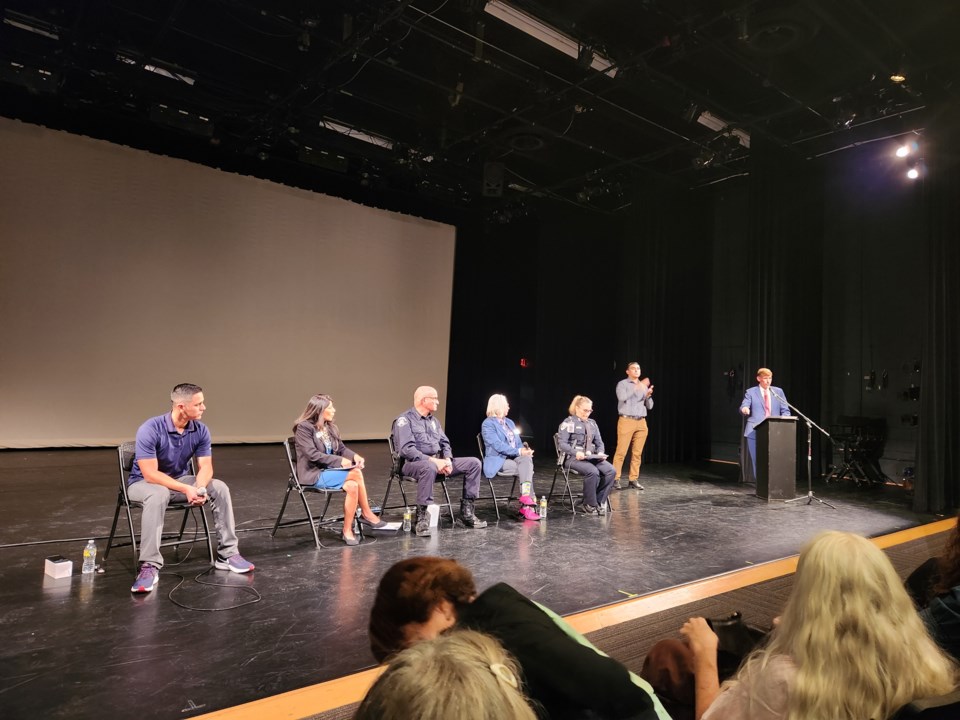Elected officials and community members from across Boulder County attended a town hall hosted by District Attorney Michael Dougherty on Tuesday to talk about community safety and justice.
The two hour discussion at the Dairy Arts Center in Boulder touched on crime trends, gun violence, auto theft, hate crimes, homelessness and more. Representatives from Longmont, the St. Vrain Valley School District and state legislators were among the many officials who attended the meeting.
The event also included a panel discussion between Boulder County Commissioner Marta Loachamin, Boulder County Sheriff Joe Pelle, University of Colorado Boulder Police Chief Doreen Jokerst, Out Boulder County Executive Director Mardi Moore and community advocate Angel Sanchez.
While the discussions were far-ranging across the topic of public safety and community justice systems, a few themes emerged.
Pandemic impacts
Dougherty said there are currently 23 pending murder cases for his office, an all time high. Part of that is due to the increase of murder cases in the state, but also a result of the pandemic due to the trials that were delayed.
Dougherty highlighted the fact that crime has been trending upwards in Boulder County and across the state, both violent and nonviolent. Auto thefts have especially spiked in the state and county, and the district attorney outlined some of the underlying reasons, from financial stress to substance abuse, homelessness and the desire to commit other crimes — all things that were worsened by the pandemic.
On top of this, jails had to simultaneously limit who they were taking in due to the contagiousness of the disease, focusing on violent offenders. This meant more tickets for lower level crime and more personal recognizance bonds to keep the jail population low.
“We were able to contain and keep COVID from killing people in our jails,” Pelle said. “Many jails around us experienced inmate and deputy deaths … We were able to dodge that bullet thankfully, but we’re paying for that. We’re paying for the fact that now there are a lot of people with a lot of warrants out for failure to appear on all those multiple summonses they received.”
The Boulder County Jail is now very full, Pelle added, with a little over 450 people in the jail today with roughly 85% awaiting pretrial — a much higher proportion than before the pandemic. He added that those numbers are finally improving as the courts catch up, if slowly.
Pelle said 62% of the people in the jail have been diagnosed with a significant mental health disorder, with 54 awaiting court-ordered transfers to a state mental health institution.
Mental health
The lack of mental health and substance abuse treatment options in Colorado was also a major concern for Dougherty, especially as those problems were exacerbated by the pandemic.
“Ignoring it can’t be the answer,” he said. “We don’t help anyone when we do that. It’s a multi-pronged response.”
The district attorney pointed to his office’s mental health diversion program, one of the only in Colorado.
This connected to another hot topic in Boulder County: homelessness and what to do about it. Dougherty and several members of the audience specifically referenced a homeless encampment in Boulder.
Pelle spoke to the frustrations of the public and law enforcement when it comes to best handling the issue in a way that balances community members feeling safe and actually addressing the root causes of homelessness. He pointed to the need for more treatment resources for the homeless people facing these issues.
“Those cops are dealing with those folks out there who are causing discomfort, lifestyle and quality of life issues, they have two choices: jail or the emergency room,” Pelle said. “Neither of which is equipped to fix the root of the problem.”
Inequity
Another priority for Dougherty is addressing the racial inequities that exist in the criminal justice system. He shared information about the case data dashboard recently released by his office that is meant to increase transparency and look at disparities in prosecution.
Sanchez spoke to the mistrust he’s been seeing in his community with law enforcement due to the rising tensions across the country.
“There is very much a very real experience that’s very different for Black and Brown folks in this country when navigating relationships with law enforcement,” he said.
Moore spoke to the increase in hate crimes both in Colorado and nationwide, especially against transgender people and other members of the LGBTQ community along with racial minorities. She noted specifically that hate crimes spiked after the election of President Donald Trump and have not let up, but also pointed to the improved relationship between community members and law enforcement.
“Do I think all police do a great job? No, but I think the liaisons we have built out in the programs and the leadership that we’ve had here are doing a tremendous job for our community around safety,” she said.


